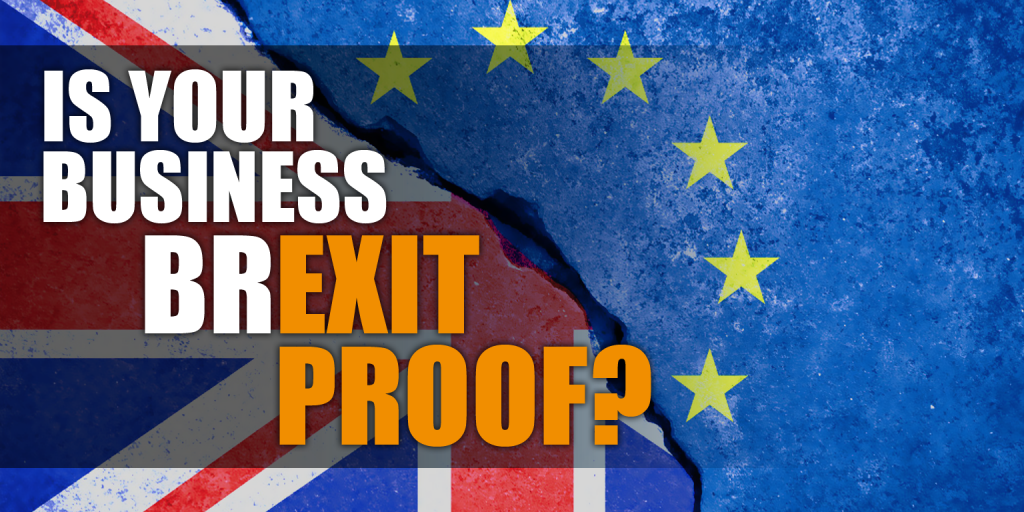A discussion: Challenges for Small to Medium Enterprises (SMEs) & Post Brexit
Small to medium-sized enterprises (SMEs) quantify 99.3% of the whole private sector and contribute to an annual turnover of £1.9 trillion in the UK. (Call out image)

Brexit
In the current economic, political and social climate, it’s more important than ever to establish the position of SMEs. What environment does your SME operate within? What are your greatest challenges and opportunities? What are your plans post-Brexit? Since June 2016, times of uncertainty and rapid change have unfolded, and many questions continue to go unanswered.
Brexit isn’t the only issue either. Small business leaders are continuing to point to other influencers impacting growth: new technology; correct recruitment; and managing compliance with new regulations, such as GDPR. As the turbulent economic environment continues, 65% of SMEs feel that there should be more government support to help them weather the challenges they face.
Brexit & Success
A 2017 survey (conducted by Dun & Bradstreet) suggested the following–
- The single most important external factor for SMEs was (of course) Brexit.
- 75% of SME leaders saw recruitment of the right talent as having the most impact on future growth.
- Whilst, 41% of that figure believed Brexit could negatively impact their ability to recruit the right talent.
- 69% of SMEs report to have been affected by the fluctuating value of the pound.
- 64% of SMEs said the outcome of Brexit is most important for their success.
- 40% of SMEs said that Brexit has significantly slowed their growth.
- 37% of SMEs said they had cancelled or postponed plans as a result of Brexit.
No two SMEs are ever the same. There is significant scope in the challenges faced by SMEs, according to different sectors and regions where businesses operate. We now face even more uncertainty as the 31stOctober leave date was not met; another General Election and an agreed deal for Article 50 still remain to be concluded.
Late Payments
Brexit, Brexit, Brexit. We’re fed up discussing it and I bet you are, too. Anyhow, in other matters, late payments continue to be a further critical issue for SMEs. Smaller enterprises are much more reliant on cash flow than their larger counterparts and have smaller cash reserves and fewer options to rely upon when waiting for payments.
According to the same survey as previously referenced, 48% of SMEs said overdue invoices had impacted their business critically. The personal impact can be very detrimental as 15% of business leaders reported that they had to use their own savings or assets to cover the shortfall. Furthermore, 63% of business leaders said that late payments have the most significant impact on their business than any other external factor. Around 62%of SMEs believe that legislation should be passed to tackle the issue.
Finance
Focusing on day-to-day challenges such as late payments isn’t the only problem that prohibits business growth. Sourcing finance proves a challenge, too. Many SMEs are looking ahead at investing in the future; for that reason, it is critical that they have access to both finance and support.
The most popular forms of finance are:
- Business loan from bank.
- Personal loan (friend or family member).
- Private investor.
- Government schemes.
Dealing with External Challenges
It’s impossible to imagine a business environment where a small to medium sized business owner doesn’t have to contend with external challenges. So, here at The Buxton Partnership we’ve compiled a few suggestions with how to deal with said challenges.
- Be Proactive – It’s important to always be doing something. Perhaps waiting is the right decision… However, it can generate a sense of anxiety if you’re not exercising any level of control.
- Creativity – How can you turn what seems to be a disaster into a new beginning?
- Remain Objective – Remain focused. Make decisions based on information and evidence, rather than emotion.
Summary
The next year will be paramount for the future of the UK economy and the small businesses vital to it. Luckily, small businesses are strong and robust. Over 58% are confident that their business can achieve financial growth over the next five years, suggesting that SMEs remain optimistic and determined to succeed.



